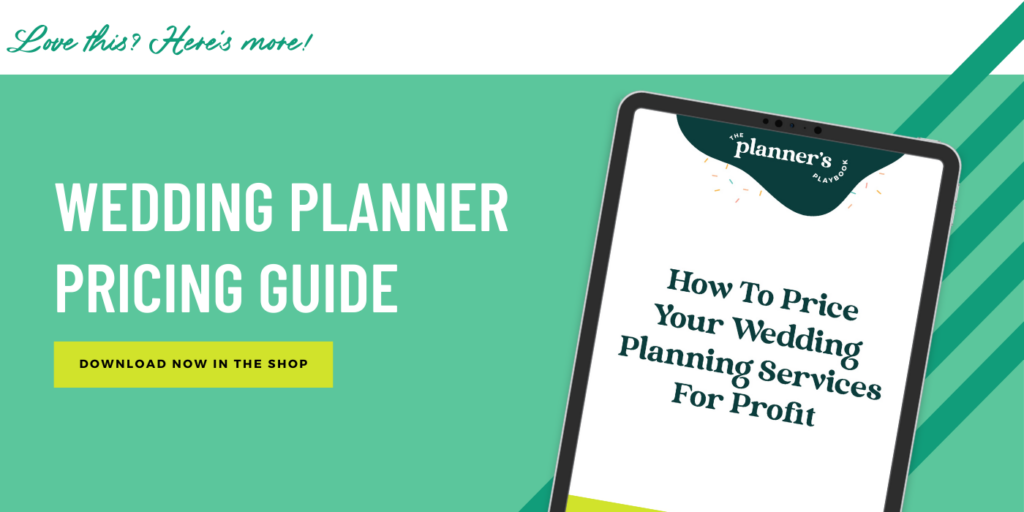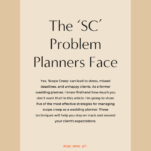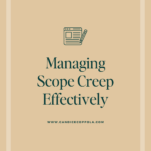Scope creep is one of the fastest ways to create stress, blow timelines, and end up with clients who are… less than thrilled. And as a former wedding planner myself, trust me, you do not want to be in that position. I’ve lived it, learned from it, and coached hundreds of planners through it. In this article, I’m breaking down five of the most effective strategies to stop scope creep in your wedding planning business.
Whether you’re a seasoned wedding planner or just starting out, read on to learn how to prevent scope creep and still deliver unforgettable events.
First, What is Scope Creep?
Scope creep in wedding planning happens when the client’s expectations or requirements change during the planning process. It can occur for several different reasons:
- They having unrealistic expectations
- Being indecisive
- The wedding grows in size (because of budget or guest list)
For example, a client may start with a simple outdoor wedding so you charge them a flat rate but later on, they want more flowers, lighting, and other decor elements. This can lead to extra expenses, time-consuming adjustments, and added stress for you as their wedding planner (that you didn’t charge for!).

The Impact of Scope Creep on Wedding Planners and Clients
I’m going to get to the “how” in a minute, but first, I want to share a little more about why this is so important. Scope creep can have a significant impact on both the wedding planner and the client.
For wedding planners, scope creep can cause stress, anxiety, and burnout. It can also lead to missed deadlines, additional costs, and strained relationships with clients.
On the flip side, when scope creep isn’t managed well, your clients feel it too. Expectations go unmet, stress starts to build, and suddenly they’re dealing with extra costs, delays, and a planning experience that feels a lot messier than it should. Even the most wonderful clients can grow frustrated when the process starts drifting outside the lines (and that frustration often stems from unclear boundaries, not bad intentions).
After all, most couples aren’t TRYING to scope creep, right? Hopefully, you’ve weeded those red flags out in the sales process. But if you struggle with clients who push, test, or flat-out ignore your boundaries, make sure you listen to this episode of the Power in Purpose Podcast on how to set boundaries with demanding wedding clients. It’ll help you navigate those tricky moments long before scope creep ever shows up.
Now, let’s dive into the strategies.
Want more? Check out this video on my YouTube channel ↓
1) Setting Clear Expectations and Boundaries
One of the most effective ways to prevent scope creep is to set clear expectations and boundaries from day one. During those early conversations about your clients’ wedding vision, don’t rush the process. Take the time to fully define what the project includes (and what it doesn’t). Every detail you clarify upfront becomes a safeguard later.
Be explicit about the services that are part of your package, the ones that aren’t, and any limitations or guardrails they should be aware of. When you communicate your scope clearly and confidently, you create a solid framework for your entire working relationship.
This not only helps you manage expectations, but it also eliminates the kind of “I thought that was included” misunderstandings that lead straight to scope creep in your wedding planning business.
2) Communicating Effectively with Clients
As a wedding planner, effective communication is the cornerstone for preventing scope creep in your projects. Keeping your clients well-informed about any changes or updates, and being transparent about challenges or issues that may arise, is crucial. Regular check-ins and status updates will help ensure that everyone is on the same page and that your client’s expectations are being met throughout the planning process.
And if communication feels overwhelming (or, let’s be honest, you’re tired of rewriting the same client emails over and over) you’ll love my post on how to use ChatGPT for your wedding business. It’s packed with ways to streamline your communication, write clearer client updates, and even help you word boundary-setting responses without the stress.
In addition to regular check-ins and clear communication, actively listening to your client’s feedback and addressing their concerns proactively is important. I often find it’s easier to say “no” when you can anticipate a question in advance. Don’t forget that it IS okay to say no!
3) Creating a Detailed Contract
When it comes to wedding planning, a detailed wedding planner contract is a must-have. It’s like a roadmap that covers everything from the project scope and timeline to the budget and any extras. We also need to make sure we have a smooth change management process in place to handle any tweaks along the way. By putting it all in writing, we can avoid any confusion and make sure everyone is on the same page.
Make sure your contract includes exactly what happens if the scope of the work changes (like the client increases their budget and decides they do want an estate wedding with an outdoor tent and a live band, after all). This will help reduce any potential disputes down the line.
4) Don’t be afraid to say “no” to requests that aren’t in your contract
I have a saying in my business – your couples are entitled to ask, but they aren’t entitled to get what they ask for.
Being a successful wedding planner means knowing how to tactfully say ‘no’ when necessary. Saying no is a muscle, and trust me – you’ll get better at it as you do it more often. Saying no when necessary enables us to maintain the integrity of our work and ensure that we deliver on our promises without compromising the quality or exceeding the agreed-upon parameters of the wedding planning process.
When your couple wants to add something on, like for example, if they wish to include rehearsal dinner planning or want more design work than initially charged for, you have two options: decline the request directly or offer the addition at an extra cost. Again, it’s easier to explain that there is an additional charge when that was explained upfront during the sales process (and again in the contract).
Scope creep isn’t just about protecting your time, either. There are times when a client’s request may fall outside of your specialty area or might not be feasible within the budget and timeline. It’s okay to not be an expert at everything. In such cases, it’s important to just say no and explain why it might not be suitable for the event. Sometimes all you can do is communicate your professional opinion and offer alternative solutions that align with the event’s theme and budget.
5) Have a Solid Planning Process in Place
And finally, having a strong, well-defined planning process is one of the best safeguards against scope creep. Clear boundaries and expectations are essential, yes, but they only work when supported by a solid workflow behind the scenes.
This starts with a detailed contract that spells out your services, timelines, and budget (just like we’ve already talked about). But it goes beyond the paperwork. Your clients should also receive an organized planning timeline, clear next steps, and regular updates from you throughout the process. When they understand what’s happening, when it’s happening, and what’s included, things stay on track — and you stay in control.
Unpopular opinion: if you aren’t educating your couples on your signature process during the sales process, it’s because you don’t have one.
While it’s important to listen to your client’s ideas and desires, remember that you are the professional guiding the ship. If you allow your clients to jump around their wedding planning tasks and ask questions repeatedly and haphazardly, it becomes challenging to regain control.
Need to Perfect Your Wedding Planning Process?
You could do it the hard way (through trial and error and years of experience), or you can grab this playbook in my shop!
Inside, you’ll find everything you need to know to:
- Set goals and intentions for your client’s journey
- Group your client’s journey into easy-to-manage phases
- Learn the seven critical phases of the planning journey
- Provide a higher level of service to your full-service clients
- Create better systems and processes around each planning phase
- Feel more organized and in control of the planning process
- Communicate your signature planning process at every phase
If you want to skip to the good part (where you have solid systems and processes in place and feel confident explaining your planning process to current and potential clients), grab my guide to creating a signature wedding planning process here.

Change in Scope is Often Unavoidable, Which is One of the Reasons I Recommend Percentage Pricing
No matter how much work you as a wedding planner put into preventing and controlling scope creep, ultimately, it can still happen. Many couples have different visions than when they first began, and changes in their vision can lead to added expenses and time that wasn’t originally planned for.
To ensure that you are paid appropriately for the additional work and costs associated with making these changes, one way to protect yourself is by using percentage pricing instead of a flat rate. This way, as the scope of the work increases or decreases due to changes in plans or budget, your pay will follow suit accordingly.
In my shop, you can find my complete guide to wedding planning pricing, which will provide you with all the tools you need to ensure that you’re getting compensated appropriately for your services. It covers everything from flat rate to percentage pricing so that no matter what the scale of the project, you know exactly how much you should be asking for. Grab your copy here!

Frequently Asked Questions About Scope Creep in Wedding Planning
What’s the biggest cause of scope creep for wedding planners?
The #1 cause of scope creep is unclear expectations. When clients don’t fully understand what’s included (and what isn’t), they assume more is part of your job than actually is. This is why clear boundaries, clear communication, and a detailed contract matter so much. They eliminate the “I thought that was included” conversations before they ever happen.
How do I say no without sounding rude or unprofessional?
Tone matters. Instead of a hard “no,” try:
- “That’s outside my scope, but I can absolutely add that for X.”
- “Here’s who you should ask for that.”
- “That’s not included, but happy to guide you toward the right solution.”
Your clients are allowed to ask, but you’re not required to say yes.
What if my client gets upset when I charge extra?
If your contract and onboarding were clear, clients will usually understand. Most frustration comes from surprise charges, not additional charges. Be upfront in the beginning and repeat your scope often, that way clients know exactly what to expect when something falls outside your service package.
How do I avoid scope creep during month-of or wedding management services?
Month-of clients are notorious for trying to sneak full-planning tasks into your scope. The key is:
- A very clear month-of workflow
- Strong onboarding
- Weekly check-ins
- Templates for “this is not included” responses
- Charging appropriately for add-ons
If you want support with this, grab my Month-of Coordination Playbook, it’ll walk you through the entire system step-by-step.
Can AI help me manage scope creep?
Absolutely. AI can help you:
- Write clear boundary-setting emails
- Create timeline or checklist templates
- Respond faster to repetitive questions
- Anticipate client needs
- Document decisions in real time
If you want to start using AI to make communication easier (and reduce chances of scope creep), don’t miss my post on the best ChatGPT prompts for wedding pros.
How to Avoid Scope Creep As a Wedding Planner
To sum up, managing scope creep in wedding planning is key to delivering flawless events and achieving maximum profitability or work-life balance. Scope creep is one of the biggest problems wedding planners face – but it can be avoided! By implementing strategies like setting clear expectations, having effective communication, sharing detailed contracts, knowing when to say no, and following a strong planning process, you can successfully prevent scope creep. I will be cheering you on as you do!
Ready to Elevate Your Wedding Planning Business?
We would love to welcome you inside The Planners’ Playbook, the membership for wedding planners who want to elevate the wedding industry and feel confident AF in their wedding planning business. From masterclasses and workshops to a deep-dive design dossier and AI tool or system/workflow being released every month, The Planner’s Playbook has everything you need to streamline your processes and save time. Plus – you’ll even get a discount on the CC shop!
Explore More Wedding Industry Resources
- Wedding Planners – Should You List Your Wedding Planner Pricing Packages On Your Website?
- What do Wedding Couples Want in 2024? 5 Ways to Data Mine For Your Business
- Marketing to Gen Z In The Wedding Industry: 5 Things You Need to Know
- Are Your Wedding Industry Sales Down? Here’s How To Figure Out What’s Wrong
- How to Stand Out in a Crowded Market: Creating a Website for Wedding Planners That Get Results
- 5 Ways to Make More Money As A Wedding Planner
- Wedding Planner Contracts You Must Have For Your Business
- Should You Increase Your Price? How to Know When It’s Time to Raise Your Rates
- How to Book Your FIRST Client as a Wedding Planner
- How To Build Your Portfolio As A Wedding Planner When You’re Just Starting Out
- Elizabeth McCravy On How To Create A Knock-Out Business Brand And Website
- Top 5 Blogging Tips For Wedding Pros in 2023
- 3 Ways To Make More Money Per Wedding Without Raising Your Prices
For More Wedding Planner Business Secrets Follow Me On Instagram
happiest of valentines days to my forever valentine! 🤍💌

As I’ve been thinking about 2026 and how I want to move into this next chapter, a phrase has kept coming back to me…
Pause, then choose.
For me, this year or phrase isn’t about slowing down for the sake of slowing down. I definitely have NO intentions on doing that. Instead, it’s about creating space before decisions.
Letting things settle.
Looking at opportunities, ideas, and next steps with clearer eyes instead of reacting out of urgency or pressure to have all the answers right now.
I’m realizing that in order to grow into what’s next for me, and this space we share, I actually need to pause first.
Pause to check in.
Pause to savor where I am.
Pause to notice what’s working, what feels aligned, and what I want more of.
Pause to see what’s around me.
And then… choose. Choose with intention. Choose with clarity. Choose from a grounded place instead of a rushed one.
This feels like both a mindset shift and a practice I want to carry with me all year and I wanted to share it in case it resonates with where you are right now, too!
Have you picked a word or phrase of the year, yet? If so, share it with me and what it signifies to you! I’m dying to know. 💜

Lesson 4: Stop waiting for someone else to validate you.
This one comes up a lot.
So many talented wedding pros are waiting to feel chosen — by the industry, by a client, by someone with a bigger platform — before they let themselves move forward.
👉🏼 Where do you think you’re still waiting for permission instead of deciding for yourself?
PSA: This is part of a 31-day series where I’m sharing one business lesson a day for wedding pros as we head into 2026. These lessons are pulled straight from my 200th podcast episode, and the goal is conversation — not perfection. I’m glad you’re here.

Lesson 3: Your reputation is built in the small, unseen moments.
This is something I’ve watched play out over and over again in this industry.
How you communicate when things are easy matters — but how you show up when things are stressful, uncomfortable, or inconvenient matters a whole lot more.
👉🏼 What do you think people remember most about working with you once the event is over?
PSA: This is part of a 31-day series where I’m sharing one business lesson a day for wedding pros as we head into 2026. These are lessons pulled straight from what I’ve seen, experienced, and talked about on the podcast — and I’m loving the conversations they’re sparking. Come back tomorrow for the next one.
#candicecoppola #weddingindustry #weddingplanner #weddingbusiness

Want more? Check out this video on my YouTube channel ↓
filed under:







+ show Comments
- Hide Comments
add a comment